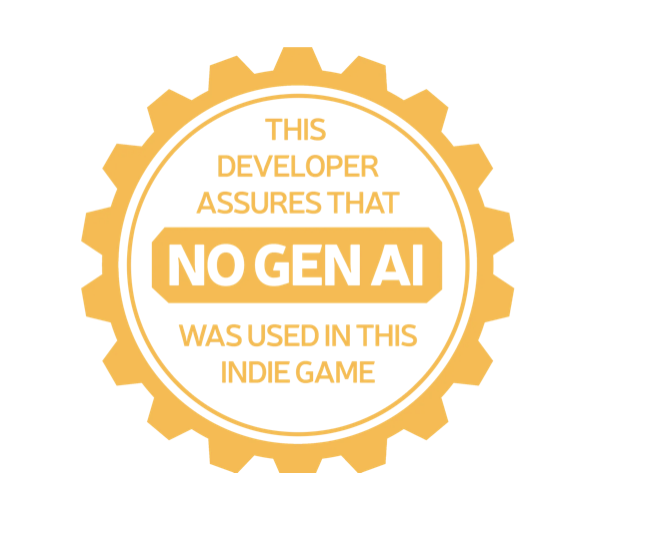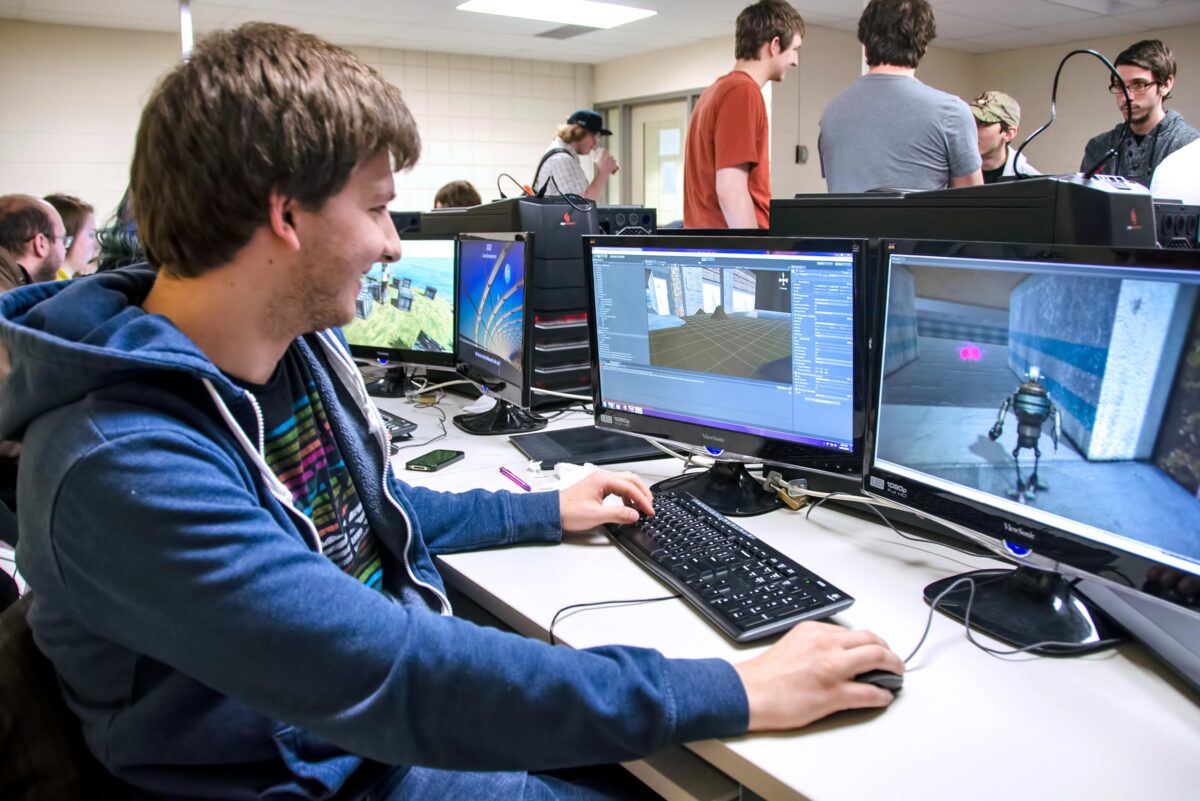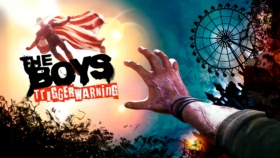When it comes to AI in media or even art, there are usually two camps: The ones swearing it’ll be the future, a more powerful tool to create games. Then there are the doubters, the artists, and the fearful, calling AI the death of creativity and artistry. The ones calling it the future, and the way into better gaming worlds, are the ones nodding along whenever the investors come calling.
It comes as no surprise, then, that indie game developers and even voice actors, as well as some other known figures in the industry, are calling out the usage of AI and actually go as far as banning it from their game development cycle altogether. A growing group of those devs and voice actors is very loudly saying ‘thanks, but no thanks’.
From AI-free labels on Steam pages to voice actors publicly warning modders and studios about using synthetic voices, a distinct counter-movement is forming. And all this is happening at the exact same time players are drifting away from bloated AAA releases and hunting for smaller, more personal, dare we say, intimate games instead.
The question is not just why they are pushing back against AI in video games now, but how long they can realistically hold that line while the rest of the industry treats AI like it’s the best thing since sliced bread. Let’s explore, shall we?
Indie Devs Selling AI-Free Video Games As a Unique Selling Point
We’ve said it for a while now, but there will be a time in the development and evolution of AI, where decidedly human products are making a comeback – and it seems this appears to be happening in the gaming industry. Alex Kanaris-Sotiriou, cofonder of Polgyon Treehouse (Mythwrecked, Röki, among others), seems to be leading that front
In order to hone that point in, he did something very simple – but pretty clever and effective this year. He designed a clean golden cog seal that certifies an Indie game as having been made without artificial intelligence, and what did he do? Yup. He released it for anyone to make use of. Indie devs can now slap it onto their Steam pages, marketing materials, or own websites as a badge of honor: This game was made by humans, with love.

The internet loves stuff like that, so no surprise there. You can spot it on pages for games like Rosewater, Astral Ascent, Quarterstaff, and others, quietly turning AI avoidance into a selling point. Some studios go even further, posting their own graphics spelling out that a person, flaws and all, created every asset, line of code, song, and brushstroke.
D-Cell Games, for example, framed the entire production of its rhythm adventure Unbeatable as deliberately human, right down to the messy bits.
AI in Gaming Defended By Corporate Heads
The corporate view on using AI in video games looks a little different.
Nexon’s CEO recently defended the use of AI voices in Arc Raiders by saying, players should more or less assume that every gaming company under the sun is going to use AI, whether you want it or not. We’re obviously paraphrasing, but the message is clear: This is the new normal, it’s everywhere, eat it up.
Ubisoft’s CEO, Yves Guillemot, has compared the impact of generative AI on the industry to the shift from 2D to 3D, and the company is already using internal tools like Ghostwriter for incidental dialogue and experimenting with AI-driven NPC systems.
Amid a controversial time after being bought out by a Saudi Arabian-backed consortium, EA has partnered with Stability AI to experiment with art and asset creation. Microsoft is openly exploring AI for level generation and gameplay support inside its development pipelines.
The indie dev scene reacted about as calmly as you’d expect. Necrosoft Games, the team behind Demonschool, publicly stressed that their game is fully human-made and said they would rather do something drastic to themselves than bring generative tools into their pipeline. Trinket Studios, D-Cell, Strange Scaffold, and others chimed in with similar sentiments, treating human-only production as part principle, part brand identity.
As expected, big companies treat the usage of AI as a simple economic move, since in their minds, budgets are exploding, and their investors want predictable outcomes for their investments. So a tech solution, which could, A, cut down on that pesky employee cost, and B speeds up, well, any process really, is a win in their books. We don’t have to tell you that this doctrine isn’t new – these big companies have long since ceased to treat video games as an art form best treated with love and care. Big IPs are cash cows to them.
Voice Actors Are Speaking Out on AI in Gaming Too
Even some voice actors are increasingly vocal about AI in video games, especially where their voices are being cloned without any consent given – or even asked for.
Earlier this year, Aspyr used AI to reproduce a French vocal performance for Lara Croft in their Tomb Raider remake, without telling the original voice actor she had been replaced.
In the German Gothic community, long-time fans will know a humble guy called Bodo Henkel as the voice of the demonic sorcerer Xardas. He has used his YouTube channel and community posts to politely – and in typical Bodo Henkel fashion, we might add – ask that fans and modders stop feeding his performances into TTS and voice-cloning systems, and has framed the issue as a question of basic control over his own voice and likeness. To him, even non-commercial mod projects cross a line when they replicate his sound without a proper agreement.
Bodo isn’t the only one complaining about that, though, as the voice actress of Serena in The Elder Scrolls V: Skyrim DLC Dawnguard has pretty much said the same thing. You can also see how that is understandable – modders and other devs can make that voice actor do or say whatever they want.
Reuters also recently reported on more and more French and German voice actors pushing national and EU regulators for clear rules around AI dubbing; consent, compensation, and protection of their back catalogues from being turned into training data or synthetic performances forever. Industry groups have collected tens of thousands of signatures, arguing that AI voices may be cheap and convenient, but they are eroding the craft and the livelihoods underneath.
Can Anti-AI Studios Survive the Onslaught?
Right now, taking a hard stance against the usage of AI in gaming might be a good call, even a slightly profitable one, since the players’ frustration with corporate and their soulless, live-service slop is at an all-time high.
But the truth is, the tech is getting better, and the budgets aren’t getting smaller, if the past is any indicator. The same AI tools that make some of the executives and investors we’ve mentioned salivate will eventually be sold back to small studios as a form of off-the-shelf solution for faster animations and automatic asset dispersion.
So how deep does that moral stance run? How many Indie devs are going to stay strong? If even other competitor – formerly Indie – studios can cut off months of dev time and still manage to ship something players will want to play, how long will they be able to resist? That remains to be seen.






